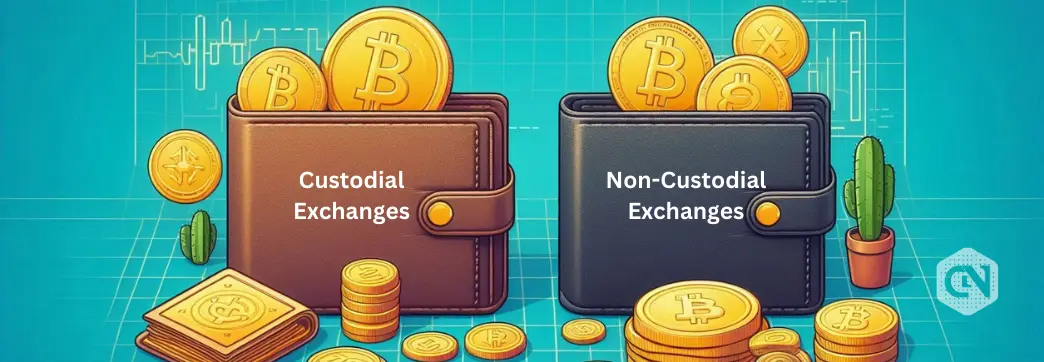Modern crypto wallets have made cryptocurrencies accessible to everyone. Crypto wallets function as any other wallet but only for storing digital assets. Instead of holding physical items, crypto wallets store private keys that users employ to sign for their crypto transactions. The popularity of crypto wallets has led to the emergence of two main exchange structures based on how they handle stored digital wallets: custodial and non-custodial wallets. There is a subtle difference between custodial and non-custodial exchanges and centralized and decentralized exchanges. For a better understanding, read our Centralized vs. Decentralized Crypto Exchanges.
In this article, we will share the key differences between custodial and non-custodial crypto exchanges in terms of functionality, security, and user control.
Understanding Crypto Wallets: A Pre-Exchange Primer
Crypto wallets are available on cryptocurrency exchanges in the form of software applications that can be used with a stable internet connection to access blockchain networks. They store an individual’s private keys, which are essential for managing and accessing their crypto holdings. There are two types of crypto wallets – hot wallets and cold wallets – the primary means of exchanging and storing cryptocurrencies. Hot wallets are online and internet-enabled while cold wallets are offline and are available in the form of a physical device like a USB stick.
Crypto wallets have two main components – private keys and public keys. The keys are made up of a string of numbers and letters designed for different needs. Crypto wallets hold the private keys to cryptocurrencies after mining or purchasing them. Whoever holds the private keys controls the crypto funds stored in the wallet.
Understanding Custodial Exchanges
Custodial crypto exchanges are digital platforms that allow users to buy, sell, or trade cryptocurrencies like Bitcoin and Ethereum. They act as custodians of users’ funds and hold the private keys to their cryptocurrencies. Custodial crypto exchanges function similarly to banks, where users deposit money or crypto into their bank account or exchange wallet. The exchange then manages the user’s private keys and allows them to trade.
The advantages of custodial crypto exchanges are –
- Convenience – Custodial crypto exchanges offer user-friendly and simple interfaces with easy crypto buying and selling options for beginners to get started
- Security – They make high investments in top-notch security features to protect client assets.
- Features – Custodial exchanges offer additional features such as interest-bearing, staking, and trading accounts.
Advertisement
Disadvantages of custodial exchanges are –
- Lack of control – Users cannot hold their private keys, which limits their control over the cryptocurrencies they purchase.
- Counterparty risk – There is a possibility of a custodial exchange getting hacked or facing insolvency. During such cases, clients’ funds might be at risk.
- Limited functionality – Not every custodial exchange offers advanced features such as margin trading or staking.
What are Non-Custodial Exchanges?
Non-custodial crypto exchanges provide users with complete ownership of their assets and generate private keys upon wallet creation. They are also known as self-custodial exchanges that facilitate crypto trading without holding client funds and private keys. Users can connect their personal hot or cold wallets directly to their decentralized exchange platforms. Trades on non-custodial exchanges take place directly between the users without requiring any intermediaries.
The advantages of non-custodial exchanges are –
- Security – Security is the most essential factor of non-custodial exchanges, as users can retain complete control over their private keys, thereby minimizing the risks of hacking.
- Privacy – Self-custody exchanges offer more privacy compared to custodial exchanges. Since users are in control of their assets and private keys, they can keep their transactions and crypto holdings more private.
- Decentralization – Non-custodial exchanges align with the key principles of crypto–censorship resistance and user control.
Disadvantages of non-custodial exchanges –
- Complexity – Non-custodial exchanges require a strong understanding of cryptocurrency wallets. Moreover, the interfaces might be less user-friendly and intuitive.
- Liquidity – Non-custodial crypto exchanges are also known for having less liquidity compared to custodial counterparts, offering lower trade volumes for certain tokens.
- Slow transactions – The transaction speed on non-custodial exchanges can be slower than on custodial exchanges.
How to Choose the Right Crypto Exchange For You

The online crypto market has several options for crypto exchanges to choose from. Choosing the best crypto platform that prioritizes user account security can be a challenging task. Here are a few factors to consider while choosing the right exchange –
- While crypto is a secure currency, users still need to ensure that crypto is used safely. It offers many security measures, such as two-factor authentication, cold storage, and encryption protocols that crypto exchanges employ to keep client funds safe.
- Choose a crypto exchange depending on the current experience level. Determine whether you are a complete beginner, an intermediate, or an advanced trader, and choose exchanges accordingly.
- Evaluate your investment goals and choose a platform based on whether you want to achieve short-term or long-term investments.
- Depending on the level of control and privacy users are looking for; many crypto exchanges require varied degrees of client information for registration and account creation.
Conclusion
Advertisement
Custodial and non-custodial exchanges have their benefits and limitations. For users who prioritize convenience, ease of use, and security, custodial exchanges are the most sensible solution. However, for those who want full ownership and control over their private keys, non-custodial exchanges are what they are looking for. Ultimately, the decision lies on the users.

